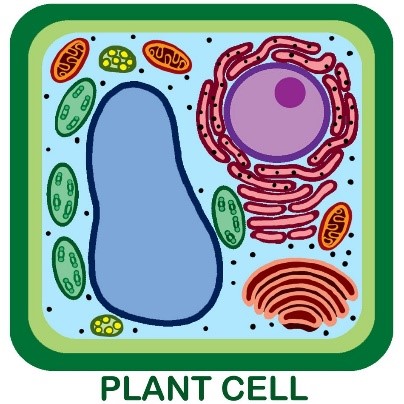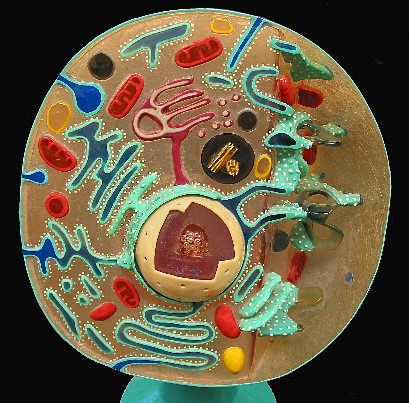Plant and Animal Cells
Grade 6 Science Worksheets
Cell – The Basic Unit of Life
The cell is the most basic unit of life. All living things – all plants and all animals – are made up of many cells.
Most cells are extremely small and can only be viewed under a microscope. Some living things, such as bacteria, yeasts, amebae and algae, simply consist of one single cell (Unicellular) which is capable of carrying out all the functions of the living being. Plants and animals are made of millions and millions of cells (Multicellular), each set of cells specialized for a particular function. For example, the human body has muscle cells, nerve cells, cells that make up the heart, lungs, and other organs, and so on.
Cells come in all kinds of shapes and sizes. They typically have a Cell Membrane or Cell Wall around the outside which holds all the contents of the cell together.
Schedule a Free session to clear worksheet doubts
No credit card required, no obligation to purchase.
Just schedule a FREE Sessions to meet a tutor and get help on any topic you want!
Unicellular Organisms
Most unicellular organisms simply look like tiny balls. Other unicellular organisms, such as bacteria, resemble balls, rods and coils. Some may be shaped like boxes – square, round, oblong, triangular. The ameba has no particular shape at all!
Plant Cells
Most multicellular cells of plants are shaped like cubes or rectangles. Plant cells contain organelles known as Chloroplasts which contain a pigment called chlorophyll. Chlorophyll is essential for the process of photosynthesis in plants to produce energy-rich sugars. All life on earth depends on these sugars.
The cell walls of most plant cells are primarily made up of Cellulose fibers, which provide stiffness to the stems of plants.

Personalized Online Tutoring from eTutorWorld
eTutorWorld offers affordable one-on-one live tutoring over the web for Grades K-12, Test Prep help for Standardized tests like SCAT, CogAT, MAP, SSAT, SAT, ACT, ISEE and AP. You may schedule online tutoring lessons at your personal scheduled times, all with a Money-Back Guarantee. The first one-on-one online tutoring lesson is always FREE, no purchase obligation, no credit card required.
For answers/solutions to any question or to learn concepts, take a FREE TRIAL Session.
No credit card required, no obligation to purchase.
Just schedule a FREE Sessions to meet a tutor and get help on any topic you want!

Animal Cells
Animal cells are generally smaller than plant cells. Multicellular animal cells have the greatest variety in shapes – they may be round, egg-shaped, square, or rectangular. Some muscle cells are long and thin, pointed at the ends. Some nerve cells are branched like trees.
The shape of a cell is related to the function that the cell needs to carry out. Long muscle cells can expand and contract to do work. Branched nerve cells can relay messages to all parts of the body.
The size of any multicellular plant or animal is determined by the total number of cells it has, and not the size of the cells. An elephant or a giant Sequoia tree has trillions of more cells than a mouse or a small bush, not because the cells are larger or smaller in size.

Check Point
- Which of these is multicellular?
- Bacteria
- Algae
- Giraffe
- Ameba
- Which of these is unicellular?
- Rose Plant
- Bacteria
- Cat
- Sequoia tree
- Plant cells are made up of structures known as ______ which contain ______ which is essential for the process of ______.
- Plant cells walls contain ______ to provide stiffness to stems.
- ______ cells are branched so that they can relay messages to all parts of the body.
Answer Key
- c) Giraffe
- b) Bacteria
- Chloroplasts, Chlorophyll, Photosynthesis
- Cellulose
- Nerve cells, also known as neurons
Schedule a Free session to clear worksheet doubts
No credit card required, no obligation to purchase.
Just schedule a FREE Sessions to meet a tutor and get help on any topic you want!
Learn more about Scientific Method and other important topics with 7th Grade Science Tutoring at eTutorWorld. Our expert science tutors break down the topics through interactive one-to-one sessions. We also offer the advantage of customized lesson plans, flexible schedules and convenience of learning from home.
Pricing for Online Tutoring
| Tutoring Package | Validity | Grade (1-12), College |
|---|---|---|
| 5 sessions | 1 Month | $124 |
| 1 session | 1 Month | $25 |
| 10 sessions | 3 months | $239 |
| 15 sessions | 3 months | $354 |
| 20 sessions | 4 months | $449 |
| 50 sessions | 6 months | $1049 |
| 100 sessions | 12 months | $2049 |
6th Grade Free Worksheets
- Inquiry process
- Nature of Science
- Scientific Inquiry
- Inquiry, Analysis and Problem Solving
- Ethical Practices
- Science and Society
- Biotic and Abiotic Factors
- Impact of Organisms
- Adaptation
- Spheres of Earth
- Natural Resources
- Environmental Issues
- Conservation of Earth
- Understanding Technology
- Abilities To Do Technological Design
- Structure of Earth
- Solar System
- Rocks and Fossils
- Earth Systems
- Plate Tectonics
- Evolution
- Magnetic Field of Earth
- Geologic Time
- Materials and Processes That Shape a Planet
- Astronomy
- Ecology
- Energy
- Kinetic and Potential Energy
- Energy Transfer
- Matter and its Structure
- States of Matter
- Physical and Chemical Changes
- Force and Motion
- Electricity and Magnetism
- Wave Interactions
- Sound
- Light
- Introduction to Life Science
- The Origin & History of Life On Earth
- Plant and Animal Cells
- Parts of a Cell
- The Cell Cycle
- How Living Organisms Get Energy
- Classification of Organisms
- How Plants Grow & Reproduce
- The Human Respiratory System
- The Human Cardiovascular System
- The Human Digestive System
- The Human Endocrine Systems
- The Human Nervous System
- The Human Muscular System
- The Human Skeletal System
Images Credit:
https://pixy.org/src/105/thumbs350/1054507.jpg
https://upload.wikimedia.org/wikipedia/commons/5/5f/Animal_Cell_Cross_Section_Model.jpg


